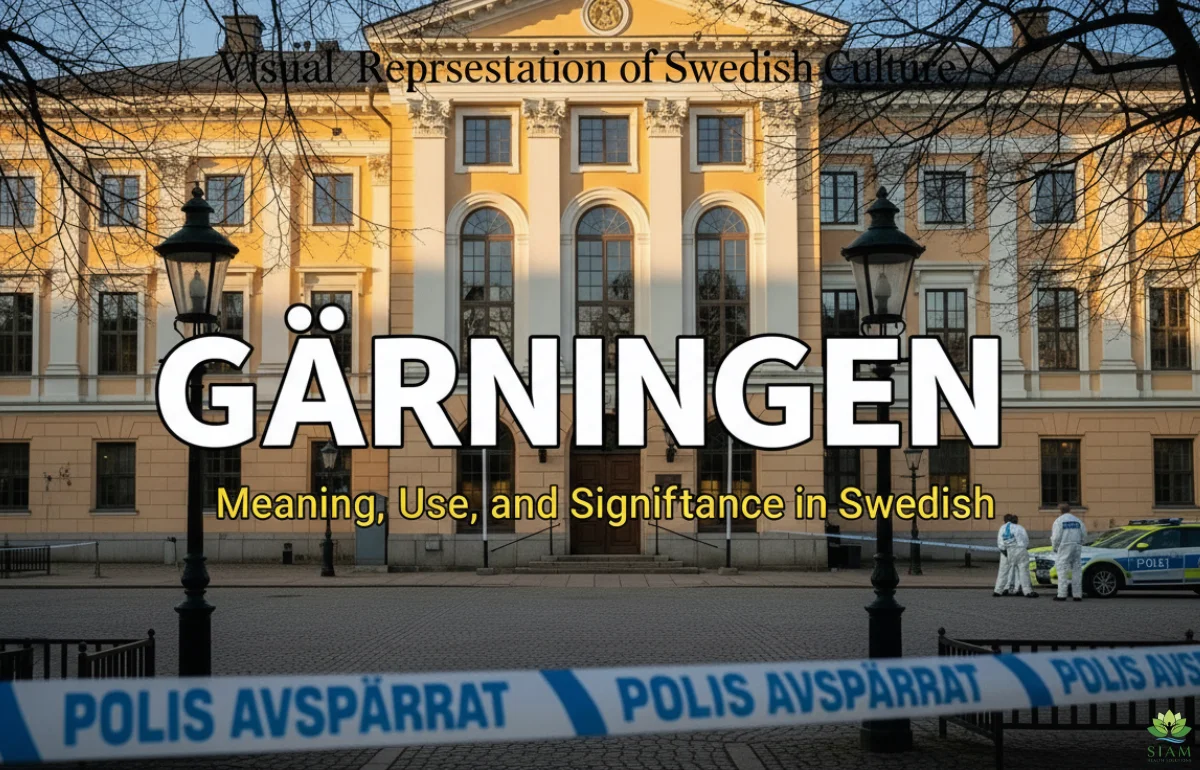The Swedish word “gärningen” translates to “the act” or “the deed” in English. While it may seem straightforward, this term has a deeper meaning and plays an essential role in Swedish law, media, and literature. This article will delve into its usage, its significance in legal discussions, and how it influences the way people understand actions in Swedish culture.
Understanding the Term “Gärningen”
At its simplest, “gärningen” means an action or deed. However, its usage in Swedish is far more complex, and it can refer to both positive acts and criminal ones, depending on the context. The word is the definite singular form of “gärning,” which is used to describe actions that have meaning or consequence.
Linguistic Origins of “Gärningen”
The word gärningen comes from the Swedish verb “göra,” meaning “to do.” By adding the suffix “-ning,” it forms a noun similar to how English uses “deed” or “doing.” This transformation reflects the action-oriented nature of the word, making it more than just a simple description but a term with moral and legal connotations.
Grammatically, gärningen follows regular rules for noun conjugation in Swedish:
| Singular | Plural |
|---|---|
| en gärning (an act) | gärningar (acts) |
| gärningen (the act) | gärningarna (the acts) |
The Legal Importance of “Gärningen” in Sweden
In legal settings, gärningen plays a pivotal role in defining actions and determining guilt or innocence. Swedish law requires a clear understanding of the nature of an individual’s deeds, as it helps differentiate between different types of crimes.
In Swedish legal terminology, terms like “uppsåtlig gärning” (intentional act) and “oaktsam gärning” (negligent act) are used to distinguish between premeditated actions and those resulting from carelessness. This distinction is crucial in determining how severe the punishment should be for a crime.
Common Legal Phrases Involving Deeds
In judicial contexts, gärningen is often seen in various key phrases, such as:
-
Tidpunkten för gärningen – “The time of the act”
-
Platsen för gärningen – “The location of the act”
-
Motivet bakom gärningen – “The motive behind the act”
These expressions help define the details surrounding a crime, providing context that’s essential in the legal process.
“Gärningen” in Crime Reporting and Media
In Swedish media, especially in crime journalism, the word gärningen is frequently used to describe the specific act that is being discussed. Whether in police reports or true crime documentaries, it highlights the gravity of the crime and sets the stage for the investigation.
A typical example seen in news reports would be:
-
Han greps på bar gärning – “He was caught in the act.”
This usage emphasizes that the criminal was apprehended while committing the crime, which is a critical point in both reporting and investigation.
True Crime and Documentaries
The term gärningen also plays a central role in Swedish crime documentaries and TV shows. Titles such as I gärningens spår (“In the Footsteps of the Act”) focus on investigating and analyzing criminal acts. This usage further connects the term to real-life investigations, reflecting its cultural importance in understanding crimes.
The Role of “Gärningen” in Swedish Literature
Beyond the legal and media contexts, gärningen also appears in Swedish literature, particularly in the crime genre. Known for its “Nordic noir” style, Swedish crime fiction often revolves around characters grappling with their deeds or acts that change their lives.
Symbolism in Crime Fiction
In literature, gärningen can symbolize a moral conflict or a pivotal event in a character’s journey. For example, a past gärning might haunt a character throughout the story, serving as the driving force behind their actions. Swedish crime novels often use these deeds to build tension, create suspense, or explore the consequences of a character’s decisions.
Writers like Stieg Larsson and Henning Mankell frequently use gärningen to explore deeper psychological and moral dilemmas. These deeds are not just actions but represent the complexities of human nature.
Cultural Reflection: The Impact of “Gärningen” in Swedish Society
The concept of gärningen is a reflection of Swedish cultural values, particularly around justice, accountability, and the consequences of one’s actions. The word suggests that deeds are not just physical actions but are laden with moral significance.
Swedish society tends to focus on the importance of personal responsibility. The term gärningen embodies this emphasis, whether in legal contexts, media reports, or fictional narratives. It underlines the idea that every action has a consequence, and individuals must be held accountable for their deeds.
Swedish Views on Accountability and Justice
The Swedish legal system, media, and culture place great importance on understanding the nature of one’s actions. Whether discussing a crime or a moral dilemma, gärningen serves as a reminder that deeds, good or bad, influence both personal lives and society at large.
Table: Contexts in Which “Gärningen” Is Used
| Context | Meaning | Example Phrase |
|---|---|---|
| Legal Context | A criminal or legal action | “Tidpunkten för gärningen” (The time of the act) |
| Crime Reporting | The specific crime committed | “Han greps på bar gärning” (He was caught in the act) |
| Literature | A pivotal or symbolic action | “A past gärning haunting a character” |
| Media & Documentaries | Focus on real-life crimes | “I gärningens spår” (In the footsteps of the act) |
FAQs
1. What is the meaning of “gärningen” in Swedish?
Gärningen translates to “the act” or “the deed” in English, and it refers to a specific action that holds meaning or significance.
2. How is “gärningen” applied in Swedish law?
In Swedish law, gärningen is used to describe the act being scrutinized. The term is important for determining whether the action was intentional or negligent, which influences the legal consequences.
3. Does “gärningen” only refer to criminal acts?
No, gärningen can refer to both positive actions and criminal acts. The context determines whether it is seen as a beneficial deed or a criminal offense.
4. How does “gärningen” appear in Swedish crime fiction?
In crime fiction, gärningen often refers to a pivotal act or event that shapes the narrative. It can symbolize a character’s moral conflict or serve as a plot device that drives the story forward.
5. Why is “gärningen” important in Swedish media?
In Swedish media, gärningen helps frame discussions about criminal actions, investigations, and true crime stories. It emphasizes the importance of understanding the specific act in question.
6. How does Swedish law differentiate between intentional and accidental actions?
Swedish law carefully distinguishes between actions that are carried out with deliberate intent and those resulting from negligence or lack of attention. This distinction is important for determining the level of responsibility and the potential consequences a person may face.
7. In what ways do Swedish crime novels influence the country’s legal discussions?
Swedish crime novels often explore the complexity of human behavior and the moral implications of actions. These novels can influence legal discussions by highlighting the psychological and social factors that may shape a person’s decisions, prompting more nuanced views in real-life legal proceedings.
8. What is the role of morality in Swedish crime media?
Morality plays a significant role in Swedish crime media, where the focus is often on the psychological motivations behind actions. Investigative documentaries and fictional works tend to examine not just the crime but the moral and ethical questions surrounding it, offering deeper insights into societal values.
9. How does Swedish society view personal accountability?
Swedish society places a strong emphasis on personal accountability. Actions are often seen as reflections of a person’s character, and there is a societal expectation that individuals take responsibility for their choices, both in everyday life and in the legal context.
10. Why is context so important in criminal investigations in Sweden?
In Sweden, understanding the full context of a criminal act is crucial to the investigation process. Factors such as motive, location, time, and intent are considered to determine the seriousness of the crime and the appropriate legal response, ensuring fairness and precision in judgment.
Conclusion
The Swedish term gärningen carries far more weight than its simple translation of “the act” or “the deed.” Whether in legal discussions, media coverage, or literature, it plays a critical role in understanding the actions that affect the lives of individuals and society as a whole. This word emphasizes the consequences of human decisions and serves as a powerful tool in Swedish legal and cultural narratives.
If you’re interested in exploring more about the Swedish language or culture, learning how terms like gärningen are used can offer valuable insights into how language reflects societal values.
Learn About Business Guide Aggr8Investing

Salman Khayam is a business consultant at Siam IT Solutions, specializing in digital marketing, PPC, SEO, web development, e-commerce, and email marketing. He designs custom strategies that deliver measurable success.


